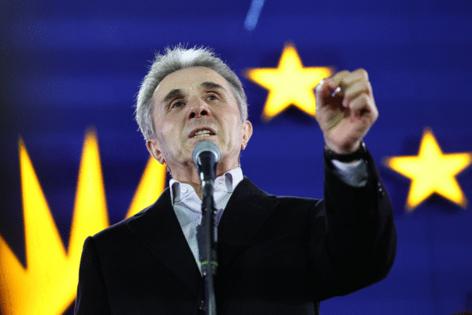Georgia's ruling party claims victory in divisive elections
Published in News & Features
Georgia’s ruling party declared victory in parliamentary elections that opponents said were rigged, and international observers highlighted several shortcomings that they said marred the outcome.
While the election report on Sunday from the observers didn’t challenge the result, it raised concerns about an uneven campaign playing field, as well as pressure put on some voters during the vote.
“Imbalances in financial resources, a divisive campaign atmosphere, and recent legislative amendments were of significant concern throughout this election process,” Pascal Allizard, the head of the short-term observer mission from the Organisation for Security and Copperation in Europe, said. Yet there are signs “of a system that is still growing and evolving, with a democratic vitality under construction.”
At the same time voters were a “offered wide choice” and found “the legal framework to be adequate for holding democratic elections," according to a joint statement produced by several organizations including OSCE, Parliamentary Assembly of the Council of Europe and the NATO Parliamentary Assembly.
There were also “reports of intimidation, coercion and pressure on voters, particularly on public sector employees and other groups,”they said.
Georgian Dream, led by billionaire Bidzina Ivanishvili, received about 54% of the votes, the election commission said after counting more than 99% of the total. The party’s four main rivals, which have pledged to support a charter drawn up by President Salome Zourabichvili to pass pro-European Union, all crossed the threshold to qualify for parliament and jointly hold about 37% of the vote share.
The opposition parties said early Sunday they do not accept the election results and called for protests if they are approved. The Georgian president summoned them for individual consultations at her palace and is expected to make an emergency statement later today.
“We are not going to accept these results — the vote was stolen and hijacked. We will fight like never before to make sure the European future is back,” Tina Bokuchava, the opposition United National Movement leader, said. “Exit polls conducted by reputable agencies from Western countries clearly showed that the opposition coalition was leading — the central election commission simply did the job for the ruling party and its leader Ivanishvili.”
Exit polls on Saturday showed contrasting results, with the pro-government broadcaster Imedi TV claiming that Georgian Dream was set to extend its 12 years in power, while the opposition-backing Mtavari TV reported that the ruling party’s rivals had received the 80 mandates needed for a majority.
Georgian Dream members were confident enough to declare victory after the first official results were announced. Ivanishvili told crowds at the party headquarters late Saturday that it’s “rare that after 12 years the government has the same trust” from society.
“I want to thank our people,” he said. “We won’t let you down.”
Alleged violations at some polling stations across the country and abroad reported by observers, authorities and the opposition are being investigated.
The “election day took place against a backdrop of serious and substantial violations,” said Londa Toloraia, spokesperson for Your Voice to the European Union, a coalition of 2,000 election observers.
Tensions have increased in the Caucasus republic of 4 million people after Georgian Dream passed legislation that the U.S. and the EU have labeled as “Kremlin-inspired.” The government ignored mass protests in May and adopted a “foreign agent” law that targeted non-governmental organizations and independent media.
Washington responded by ordering a comprehensive review of U.S. cooperation with the government in Tbilisi and imposing visa restrictions on more than 60 Georgians for “undermining democracy.” Brussels halted EU membership negotiations with the country and urged the authorities to reverse course.
The ruling party last month also passed legislation banning “LGBT propaganda” that outlaws portrayals of same-sex relationships in films, television and advertising, prevents the registration of same-sex marriages and makes it illegal for non-heterosexual couples to adopt children. Georgian Dream has also pledged to ban opposition parties if it wins a majority.
Zourabichvili has rallied opposition forces behind her charter after clashing repeatedly with Georgian Dream over its legislation. In September, she called the election a “turning point” that would “determine whether our future will be Europe or whether we’ll be under the influence of Russia.”
Ivanishvili has alleged that a “global war party” in the West is plotting to oust the government using NGOs and to push Georgia into a conflict with Russia.
The four main opposition groups are Unity — To Save Georgia, which includes members of the former United National Movement that ruled the country after the pro-Western Rose Revolution of 2003; the Coalition for Change, which also has ex-UNM leaders; the Strong Georgia alliance; and For Georgia, a party headed by ex-prime minister Giorgi Gakharia.
A total of 18 parties and coalitions were on the ballot competing for representation in the 150-seat parliament. Results show Georgian Dream lost the vote at overseas polling stations and in major cities at home, but dominated in rural areas of the country, where most allegations of irregularities were made, according to the opposition.
“Despite the reports of irregularities, it does seem that Georgian Dream’s efforts to play on fears of war and loss of Georgian identity to European integration resonated with many voters”, said Olga Oliker from the Brussels-based International Crisis Group, which works to resolve conflicts.
_____
(With assistance from Yuliya Fedorinova.)
_____
©2024 Bloomberg L.P. Visit bloomberg.com. Distributed by Tribune Content Agency, LLC.







Comments